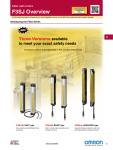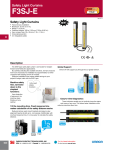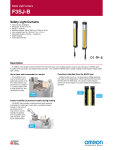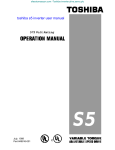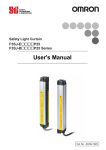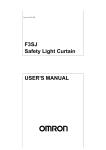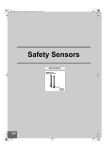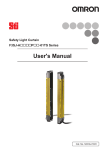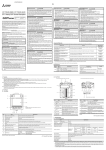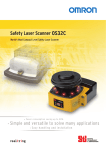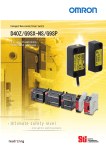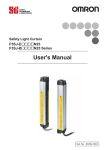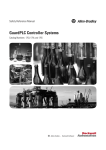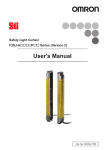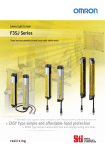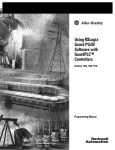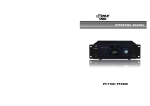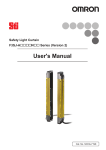Download F3SJ-E Easy Safety Light Curtains Datasheet
Transcript
Safety Light Curtains F3SJ-E F3SJE For full product information, visit www.sti.com. Use the SpeedSPEC Code for quick access to the specific web page. Safety Light Curtains • • • • • • • • Fast and easy installation Resolution: 25 mm (1.01 in.) Range: 7 m (23 ft.) Protected heights: 185 to 1105 mm (7.28 to 43.50 in.) Very compact size: 30 x 30 mm (1.18 x 1.18 in.) Cross-talk prevention 3 m integrated cables A Rapid Delivery Product: Select models are available for shipment today or within 3 to 5 days Description The EASY type safety light curtain is well suited for straightforward on/off detection applications. By carefully selecting the available functions, we have reduced man hours necessary for installation by approximately 1/2 when compared with existing STI models. Reduced installation time means added savings to your project’s budget, start with the EASY type. Machine safety first, narrowed down to the simplest functions: Global Support Omron will support you through the our global network. I only need simple functions Global Support Upon detection of personnel, the machine stops. Simple yet very optimal. Easy-to-view Diagnostics 1/2 the mounting time. Fixed response time makes calculation of the safety distance easier. These indicators enable you to intuitively know the status and cause of any error. This allows faster installation while reducing machine down time. Reduced wiring, quick mount brackets and easy-to-view alignment beams all add up to cost savings. Additionally, with one fixed response time, it is now easier to calculate the safety distance. Easy-to-View Diagnostics mounting time Mounting Time Existing models E type Select models are available for Rapid Delivery. Visit this product on www.sti.com for details. www.sti.com/info Safety Light Curtain F3SJ-E EASY type reduces implementation costs with 1/2 the mounting time. • In pursuit of simple functions: Upon detection of personnel, the machine stops. • Can be used for simple hand intrusion detection. • Implementation costs can be significantly reduced. Dimensions Related information Function List : Page 54 to 60 : Page 97 to 97 Safety Precautions : Page 99 Precautions on Safety : Page 100 to 104 Ordering Information Main Units Safety Light Curtain Application Detection capability Beam gap Operating range Protective height (mm) Hand protection Dia. 25 mm 20 mm 0.2 to 7 m 185 to 1,105 Model PNP output F3SJ-E@@@@P25 F3SJ-E@@@@N25 *1 Note: F3SJ-E uses a 3 m prewired discrete cable. *1. For S-mark compatible model, the suffix "-S" is added to the model name. (Example) F3SJ-E0185P25-S Safety Light Curtain Model List Please contact our sales representative. F3SJ-E Series (20 mm pitch) Model Number of beams 2 Protective height [mm] *2 PNP output *1 NPN output F3SJ-E0185P25 F3SJ-E0185N25 8 185 F3SJ-E0225P25 F3SJ-E0225N25 10 225 F3SJ-E0305P25 F3SJ-E0305N25 14 305 F3SJ-E0385P25 F3SJ-E0385N25 18 385 F3SJ-E0465P25 F3SJ-E0465N25 22 465 F3SJ-E0545P25 F3SJ-E0545N25 26 545 F3SJ-E0625P25 F3SJ-E0625N25 30 625 F3SJ-E0705P25 F3SJ-E0705N25 34 705 F3SJ-E0785P25 F3SJ-E0785N25 38 785 F3SJ-E0865P25 F3SJ-E0865N25 42 865 F3SJ-E0945P25 F3SJ-E0945N25 46 945 F3SJ-E1025P25 F3SJ-E1025N25 50 1,025 F3SJ-E1105P25 F3SJ-E1105N25 54 1,105 *1. For S-mark compatible model, the suffix "-S" is added to the model name. (Example) F3SJ-E0185P25-S *2. Protective height (mm) = Total sensor length NPN output F3SJ-E Accessories (Sold separately) Relays with Forcibly Guided Contacts Type Appearance G7SA Relays with Forcibly Guided Contacts G7S-@-E Relays with Forcibly Guided Contacts Specifications • Nodes: 4 • Contact type: 2A2B • Rated switch load: 250 VAC 6A, 30 VDC 6A • Nodes: 4 • Contact type: 3NO+1NC • Rated switch load: 250 VAC 6A, 30 VDC 6A • Nodes: 6 • Contact type: 4NO+2NC • Rated switch load: 250 VAC 10 A, 30 VDC 10 A • Nodes: 6 • Contact type: 3NO+3NC • Rated switch load: 250 VAC 10 A, 30 VDC 10 A Model Remarks G7SA-2A2B For details on other models or socket models, refer to the OMRON's website. G7SA-3A1B G7S-4A2B-E For details on other models or socket models, refer to the OMRON's website. G7S-3A3B-E Laser Pointer Appearance Output Model Laser Pointer for F3SJ F39-PTJ Spatter Protection Cover (2 cables per set, common for emitter/receiver) (10% Operating Range Attenuation) Appearance Model F39-HB@@@@ * * The same 4-digit numbers as the protective heights (@@@@ in the light curtain model names) are substituted by in the model names. Protective Bar Appearance Model F39-PB@@@@ *1 F39-PB@@@@-S *1 *2 Remarks • 2 Light Curtain brackets • 4 mounting brackets • 0 to 4 intermediate brackets for backside mounting (quantity required for the sensing width) • 0 to 4 intermediate brackets for mounting to the sides (quantity required for the sensing width) • 1 Light Curtain bracket • 2 mounting brackets • 0 to 2 intermediate brackets for backside mounting (quantity required for the sensing width) • 0 to 2 intermediate brackets for mounting to the sides (quantity required for the sensing width) Note: The following are not provided with the Protective Bars. • Safety Light Curtain • Safety Light Curtain Top/Bottom Brackets • Wall Mounting Screw Unit *1. The same four digits indicating protective height that are used in the Sensor model number (@@@@) are used in the part of the Protector model number. *2. Purchase the F39-PB@@@@ (which contains two sets of brackets) to use Protective Bars for both the Emitter and Receiver. Test rod Diameter 14mm dia. 20mm dia. 25mm dia. 30mm dia. Model F39-TRD14 F39-TRD20 F39-TRD25 F39-TRD30 3 F3SJ-E Mirrors (12% Operating Range Attenuation) Appearance Mirror material Width (mm) Glass mirror Thickness (mm) 145 32 Length (mm) Model 406 F39-MLG0406 610 F39-MLG0610 711 F39-MLG0711 914 F39-MLG0914 1,067 F39-MLG1067 1,219 F39-MLG1219 1,422 F39-MLG1422 1,626 F39-MLG1626 1,830 F39-MLG1830 2,134 F39-MLG2134 Remarks 2 sets of Cylindrical mounting rod, 4 screws are included. Sensor Mounting Bracket (Sold separately) Appearance Specifications Model Application Top/bottom bracket F39-LJB1 Top/bottom bracket for F3SJ-E/B 2 for an emitter, 2 for a receiver, total of 4 per set Intermediate bracket F39-LJB2 *1 *2 In combination use with top/bottom bracket for F3SJ-E/B Can be used as free-location bracket. 1 set with 2 pieces F39-LJB3-M6 *1 Quick mount bracket for F3SJ-E/B Supports M6 slide nut for aluminum frame. F39-LJB3-M8 *2 Quick mount bracket for F3SJ-E/B Supports M8 slide nut for aluminum frame. Quick mount bracket Quick mount M6 bracket Quick mount M8 bracket 1 set with 2 pieces Hexagon socket head cap screws (M6 x 10) are included. F39-LJB3-M6K *1 F39-LJB3-M8K *2 Bracket to mount an intermediate bracket to the aluminum frame with Hexagon socket head cap a single touch. screws (M8 x 14) are included. Compatible mounting bracket F39-LJB4 Mounting bracket used when 2 for an emitter, replacing existing area sensors 2 for a receiver, (F3SJ-A or F3SN) with the F3SJ-E/B. total of 4 per set Contact mount bracket F39-LJB5 Bracket to closely contact the back side of the Sensor. Note: All the sensor mounting brackets for F3SJ-E are sold separately. *1. Combining F39-LJB2 and F39-LJB3-M6K makes F39-LJB3-M6. *2. Combining F39-LJB2 and F39-LJB3-M8K makes F39-LJB3-M8. 4 Remarks 2 for an emitter, 2 for a receiver, total of 4 per set F3SJ-E Specifications (For details, refer to the instruction manual or User's manual.) Main Units F3SJ-E@@@@P25/N25 Model PNP output NPN output Sensor type Setting tool connection *1 Safety category Detection capability Beam gap (P) Number of beams (n) Protective height (PH) Lens diameter Operating range *2 Response time ON to OFF (under stable light incident condition) OFF to ON Startup waiting time Power supply voltage (Vs) Consumption current (no load) PNP output NPN output Light source (emitted wavelength) Effective aperture angle (EAA) Safety outputs (OSSD) PNP output NPN output F3SJ-E@@@@P25 F3SJ-E@@@@N25 Type 4 safety light curtain Parameter settings: Not available Safety purpose of category 4, 3, 2, 1, or B Opaque objects 25 mm in diameter 20 mm 8 to 54 185 to 1,105 mm Diameter 5 mm 0.2 to 7 m 15 ms max. 70 ms max. 2 s max. SELV/PELV 24 VDC±20% (ripple p-p 10% max.) Emitter : Up to 22 beams: 41 mA max., 26 to 42 beams: 57 mA max., 46 to 54 beams: 63 mA max. Receiver : Up to 22 beams: 42 mA max., 26 to 42 beams: 47 mA max., 46 to 54 beams: 51 mA max. Emitter : Up to 22 beams: 41 mA max., 26 to 42 beams: 57 mA max., 46 to 54 beams: 63 mA max. Receiver : Up to 22 beams: 40 mA max., 26 to 42 beams: 45 mA max., 46 to 54 beams: 48 mA max. Infrared LED (870 nm) Based on IEC 61496-2. Within ±2.5° for both emitter and receiver when the detection distance is 3 m or over Two PNP transistor outputs, load current 200 mA max., residual voltage 2 V max. (except for voltage drop due to cable extension), Leakage current 1 mA max., load inductance 2.2 H max. *3, Maximum capacity load 1 μF *4 Two NPN transistor outputs, load current 200 mA max., residual voltage 2 V max. (except for voltage drop due to cable extension), Leakage current 1 mA max., load inductance 2.2 H max. *3, Maximum capacity load 1 μF *4 Safety output: On when receiving light ON voltage: Vs-3 V to Vs OFF voltage: 0 V to 1/2 Vs or open *5 ON voltage: 0 V to 3 V OFF voltage: 1/2 Vs to Vs or open *5 Output operation mode PNP output Input voltage NPN output Mutual interference Mutual interference prevention algorithm prevents interference in up to 3 sets. prevention function • Self test (at power-ON and at power distribution) Test function • External test (emission stop function by test input) Protection circuit Output short-circuit protection, and power supply reverse polarity protection Ambient temperature Operating: -10 to 55°C (non-freezing), Storage: -25 to 70°C Ambient humidity Operating: 35% to 85% (no condensation), Storage: 35% to 95% RH Operating ambient light intensity Incandescent lamp: 3,000 lx max., Sunlight: 10,000 lx max. Insulation resistance 20 MΩ min. (at 500 VDC) Dielectric strength 1,000 VAC 50/60 Hz, 1 min Degree of protection IP65 (IEC 60529) Vibration resistance Malfunction: 10 to 55 Hz, Multiple amplitude of 0.7 mm, 20 sweeps in X, Y, and Z directions Shock resistance Malfunction: 100 m/s2, 1,000 times each in X, Y, and Z directions Pollution degree Pollution degree 3 (IEC 60664-1) Connection method: Pull-out type, cable length 3 m Number of wires: Emitter: 5 wires, receiver: 6 wires Power cable Cable diameter: Dia. 6 mm Allowable bending radius: R5 mm Extension cable 30 m max. *6 Case: Aluminum Cap: ABS resin, PBT Material Optical cover: PMMA resin (acrylic) Cable: Oil resistant PVC Weight (packed state) Weight (g) = (protective height) x 2.6 + 800 Accessories Instruction Manual, User's Manual (CD-ROM) *7 IEC 61496-1, EN 61496-1, UL 61496-1, Type 4 ESPE (Electro-Sensitive Protective Equipment) IEC 61496-2, CLC/TS 61496-2, UL 61496-2, Type 4 AOPD (Active Opto-electronic Protective Devices) Applicable standards IEC 61508-1 to -3, EN 61508-1 to -3 SIL3 ISO 13849-1: 2006, EN ISO 13849-1: 2008 (PLe/Safety Category 4) UL 508, UL 1998, CAN/CSA C22.2 No.14, CAN/CSA C22.2 No.0.8 *1. Do not use the Support Software and Setting Console for F3SJ-A. Operation cannot be guaranteed. *2. Use of the Spatter Protection Cover causes a 10% maximum sensing distance attenuation. *3. The load inductance is the maximum value when the safety output frequently repeats ON and OFF. When you use the safety output at 4 Hz or less, the usable load inductance becomes larger. *4. These values must be taken into consideration when connecting elements including a capacitive load such as capacitor. *5. The Vs indicates a voltage value in your environment. *6. To extend a cable of the F3SJ-E, refer to the User's Manual (SCHG-733/732). *7. Mounting brackets are sold separately. 5 F3SJ-E Indicator Emitter Name of indicator Label ON Blinking Top-beam-state indicator TOP Turns ON when the top beam is receiving light. Stable-state indicator STB Turns ON when incidence level is more than 170% of the output ON threshold. Blinks when the safety output is turned OFF due to disturbance light or vibration. ON/OFF-state indicator ON OFF Green: Turns ON when safety output is ON. Red: Turns OFF when safety output is OFF. Red: Blinks when the F3SJ-E enters a lockout due to a safety output error. Lockout indicator LOCKOUT Turns ON when the F3SJ-E enters a lockout on the receiver. Blinks when the F3SJ-E enters a lockout on the emitter. Power indicator POWER Turns ON while the power of the emitter is ON. Blinks when the F3SJ-E enters a lockout due to power voltage/noise. Test indicator TEST --- Blinks when external test is being performed. Bottom-beam-state indicator BTM Turns ON when the bottom beam is receiving light. --- ON Blinking --- Receiver Name of indicator Label Top-beam-state indicator TOP Turns ON when the top beam is receiving light. Stable-state indicator STB Turns ON when incidence level is more than 170% of the output ON threshold. Blinks when the safety output is turned OFF due to disturbance light or vibration. ON/OFF-state indicator ON OFF Green: Turns ON when safety output is ON. Red: Turns OFF when safety output is OFF. Red: Blinks when the F3SJ-E enters a lockout due to a safety output error. Lockout indicator LOCKOUT Turns ON when the F3SJ-E enters a lockout on the emitter. Blinks when the F3SJ-E enters a lockout on the receiver. Communication indicator COM Turns ON when communication between emitter and receiver is established. Blinks when the F3SJ-E enters lockout due to a communication error between receiver and emitter. Configuration indicator CFG --- Blinks when the F3SJ-E enters lockout due to a model type error between receiver and emitter. Internal error indicator INTERNAL --- Blinks when the F3SJ-E enters a lockout due to an internal error. Bottom-beam-state indicator BTM Turns ON when the bottom beam is receiving light. --- --- Accessories Laser Pointer Item Model F39-PTJ Applicable sensor F3SJ Series Power supply voltage 4.65 or 4.5 VDC Battery Three button batteries (SR44 or LR44) Battery life * SR44: 10 hours of continuous operation, LR44: 6 hours of continuous operation Light source Red semiconductor laser (wavelength: 650 nm, 1 mW max. JIS class 2, EN/IEC class 2, FDA class II) Spot diameter (typical value) 6.5 mm at 10 m Ambient temperature Operating: 0 to 40°C Storage: -15 to 60°C (with no icing or condensation) Ambient humidity Operating and storage: 35% to 85% (with no condensation) Material Laser module case: aluminum Weight Approx. 220 g (packed) Accessories Laser safety standard labels (EN: 1, FDA: 3) Button batteries (SR44: 3), instruction manual * Battery life varies depending on a battery used. 6 Mounting bracket: aluminum and stainless F3SJ-E Connections Basic Wiring Diagram Emitter Receiver Minimum wiring required to check the operation of the F3SJ-E [PNP Output] Open 0 V (Blue) Safety output 2 (White) Safety output 1 (Black) Open +24 V (Brown) +24 V (Brown) Test input (Black) Open 0 V (Blue) (Gray) Communication line (+) (Pink) Communication line (−) +24 VDC 0V Power supply Note: This circuit diagram is used for operation check. For an actual circuit example, refer to page 23. Emitter Receiver Minimum wiring required to check the operation of the F3SJ-E [NPN Output] 0 V (Blue) Open Safety output 2 (White) Safety output 1 (Black) Open +24 V (Brown) +24 V (Brown) Test input (Black) Open 0 V (Blue) (Gray) Communication line (+) (Pink) Communication line (−) +24 VDC 0V Power supply Note: This circuit diagram is used for operation check. For an actual circuit example, refer to page 23. 7 F3SJ-E Input/Output Circuit Diagram [PNP Output] Entire Circuit Diagram Input circuit diagram by function <Input Circuit (Test Input)> Indicator +24 VDC Brown Emitter Main Circuit Test Input Circuit Black +24 VDC Test input Short circuit current 3 mA Emitter Main Circuit 0V Blue Gray Pink Communication line (+) Communication line (-) Pink Gray Brown Receiver Main Circuit 2 White Safety output 2 Black Safety output 1 Load Receiver Main Circuit 1 Load Indicator 0V Blue [NPN Output] Entire Circuit Diagram Input circuit diagram by function <Input Circuit (Test Input)> Indication +24 VDC Brown Emitter Main Circuit Test Input Circuit +24 VDC Black Test input Emitter Main Circuit Short circuit current 3 mA 0V Blue Gray Communication line (+) Gray Pink Communication line (-) Pink Brown Load Receiver Main Circuit 2 White Safety output 2 Load Black Safety output 1 Receiver Main Circuit 1 Indication Blue 8 0V F3SJ-E Connection Circuit Examples Wiring for single F3SJ-E application [PNP Output] PL/safety category PLe/4 equivalent Model Stop category Safety Light Curtain F3SJ-E@@@@P25 Safety Relay G7SA Reset 0 Manual Note: The above PL is only the evaluation result of the example. The PL must be evaluated in an actual application by the customer after confirming the usage conditions. Emitter Receiver z Application Overview • The power supply to the motor M is turned OFF when the beam is blocked. • The power supply to the motor M is kept OFF until the beams are unblocked and the reset switch S2 is pressed. +24 V +24 V KM1 +24 V Feedback loop KM2 (Gray) Communication line (+) K1 K1 K2 K2 K3 K3 K1 K3 K2 K3 KM1 KM2 0 V (Blue) Safety output 2 (White) Safety output 1 (Black) S2 +24 V (Brown) +24 V (Brown) Test input (Black) 0 V (Blue) (Pink) Communication line (−) K1 M K3 KM1 K2 KM2 Unblocked Blocked S1 K1 K2 K3 +24 VDC Power supply 0V Reset switch (S2) External test switch / lockout reset switch (S1) Safety output K3 N.C. contact S1 S2 K1, K2, K3 KM1, KM2 M : External test/lockout reset switch (connect to 0 V if a switch is not required) : Reset switch : Safety relay with force-guided contact (G7SA) : Safety relay with force-guided contact (G7SA) or magnetic contactor : 3-phase motor K3 N.O. contact K1,K2 N.C. contact K1,K2 N.O. contact KM1,KM2 N.C. contact KM1,KM2 N.O. contact 9 F3SJ-E Wiring for single F3SJ-E application [NPN Output] PL/safety category PLe/4 equivalent Model Stop category Safety Light Curtain F3SJ-E@@@@N25 Safety Relay G7SA Reset 0 Manual Note: The above PL is only the evaluation result of the example. The PL must be evaluated in an actual application by the customer after confirming the usage conditions. z Application Overview • The power supply to the motor M is turned OFF when the beam is blocked. • The power supply to the motor M is kept OFF until the beams are unblocked and the reset switch S2 is pressed. Emitter Receiver +24 V K3 +24 V +24 V KM1 KM2 KM1 Feedback loop Communication line (+) (Gray) KM1 KM2 K1 K3 0 V (Blue) Safety output 2 (White) +24 V (Brown) KM2 Safety output 1 (Black) +24 V (Brown) Test input (Black) 0 V (Blue) Communication line (-) (Pink) S2 K1 K1 K2 K2 K3 K3 M K1 K2 K3 K3 K2 S1 K1 K2 +24 VDC Power supply 0V S1 S2 K1, K2, K3 KM1, KM2 M : External test/lockout reset switch (connect to 24 V if a switch is not required) : Reset switch : Safety relay with force-guided contact (G7SA) : Safety relay with force-guided contact (G7SA) or magnetic contactor : 3-phase motor 0V Unblocked Blocked Reset switch (S2) External test/lockout reset switch (S1) Safety output K3 N.C. contact K3 N.O. contact K1,K2 N.C. contact K1,K2 N.O. contact KM1,KM2 N.C. contact KM1,KM2 N.O. contact 10 F3SJ-E Wiring to connect a F3SJ-E with a controller G9SP [PNP Output] PL/safety category Model Stop category Safety Light Curtain F3SJ-E@@@@P25 Safety Controller G9SP Safety Relay G7SA Emergency Stop Switch A165E/A22E PLe/4 equivalent 0 Reset Manual Note: The above PL is only the evaluation result of the example. The PL must be evaluated in an actual application by the customer after confirming the usage conditions. Emitter Receiver z Application Overview • The power supply to the motor M is turned OFF when the beam is blocked. • The power supply to the motor M is turned OFF when the emergency stop switch is pressed. • The power supply to the motor M is kept OFF until the beams are unblocked and the reset switch S2 is pressed while the emergency stop switch is released. S1 S2 S3 : Emergency stop switch (force-opening contact) (A165E, A22E) : Reset switch : External test/lockout reset switch (connect to 0 V if a switch is not required) KM1, KM2 : Safety relay with force-guided contact (G7SA) or magnetic contactor : 3-phase motor M - G9SP settings - Manual reset mode - Using feedback loop Unblocked Blocked (Gray) Communication line (+) Safety output 1 (Black) Safety output 2 (White) 0 V (Blue) External test/lockout reset switch (S3) +24 V (Brown) +24 V (Brown) Test input (Black) 0 V (Blue) (Pink) Communication line (−) Reset switch (S2) Emergency stop switch (S1) Safety output KM1,KM2 N.O. contact S3 KM1,KM2 N.C. contact +24 VDC 0V V1 Si0 Si1 G1 T0 T1 Si2 Si3 Si4 Si5 +24 VDC Power 0 V supply 11 21 12 22 Si6 Si7 V2 So0 So1 T2 T3 G2 G2 G2 KM2 S2 KM1 KM2 +24 VDC Power 0 V supply KM1 GND S1 Power supply GND KM1 KM2 M Feedback loop 11 F3SJ-E Wiring to connect a F3SJ-E with a controller G9SA-301 [PNP Output] PL/safety category Model Stop category Safety Light Curtain F3SJ-E@@@@P25 Safety Relay Unit G9SA-301 24V AC/DC Safety Relay G7SA Emergency Stop Switch A165E/A22E PLe/4 equivalent 0 Reset Manual Note: The above PL is only the evaluation result of the example. The PL must be evaluated in an actual application by the customer after confirming the usage conditions. z Application Overview • The power supply to the motor M is turned OFF when the beam is blocked. • The power supply to the motor M is turned OFF when the emergency stop switch is pressed. • The power supply to the motor M is kept OFF until the beams are unblocked and the reset switch S2 is pressed while the emergency stop switch is released. Emitter Receiver - G9SA-301 settings - Manual reset mode - Using feedback loop - Using emergency stop switch Wiring for auto reset mode Feedback loop KM1 KM2 T31 T32 (Gray) Communication line (+) KM1 A B Feedback loop 12 22 11 21 0 V (Blue) Safety output 1 (Black) +24 VDC Power supply 0 V Safety output 2 (White) +24 V (Brown) +24 V (Brown) (Pink) Communication line (−) S1 0 V (Blue) Test input (Black) KM2 * If an emergency stop switch is not used, connect safety output 1 to T12 terminal and safety output 2 to T23 directly. M * Unblocked Blocked S3 KM1 S2 External test/lockout reset switch (S1) KM2 A1 A2 T12 T11 33 Interlock reset switch (S2) 41 Emergency stop switch (S3) K1 K2 K1 23 3 4 1 a 13 T31 T32 K2 K1 b K2 a b Control Circuit JP 2 5 Model G9SA-301 12 T21 T23 T22 1 2 3 4 5 6 Safety output K1,K2 N.O. contact KM1,KM2 N.O. contact 6 PE S1: External test/lockout reset switch (connect to 0 V if a switch is not required) S2: Interlock reset switch S3: Emergency stop switch (force-opening contact) (A165E, A22E) KM1,KM2: Safety relay with force-guided contact (G7SA) or magnetic contactor M: 3-phase motor A B 14 KM1 24 34 KM2 42 K1,K2 N.C. contact KM1,KM2 N.C. contact F3SJ-E Wiring to connect a F3SJ-E with a controller G9SA-301-P [NPN Output] PL/safety category Model Stop category Safety Light Curtain F3SJ-E@@@@N25 Safety Relay Unit G9SA-301-P 24V DC Safety Relay G7SA Emergency Stop Switch A165E/A22E PLe/4 equivalent 0 Reset Manual Note: The above PL is only the evaluation result of the example. The PL must be evaluated in an actual application by the customer after confirming the usage conditions. Emitter Receiver z Application Overview • The power supply to the motor M is turned OFF when the beam is blocked. • The power supply to the motor M is turned OFF when the emergency stop switch is pressed. • The power supply to the motor M is kept OFF until the beams are unblocked and the reset switch S2 is pressed while the emergency stop switch is released. KM1 0V (Blue) Communication line (-) (Pink) Safety output 2 (White) Safety output 1 (Black) +24V (Brown) +24V (Brown) Test input (Black) KM2 S1 0V (Blue) Communication line (+) (Grey) M * If an emergency stop switch is not used, connect safety output 1 to T12 terminal and safety output 2 to T23 directly. S1 +24 VDC Power Supply 0 V Feedback loop 12 22 11 21 * S3 S2 KM1 A1 A2 T11 T12 Unblocked Blocked 13 23 33 41 T31 T32 External test/lockout reset switch 3 4 (S1) Interlock reset switch K1 K2 K1 K2 K1 b K2 a b Control Circuit JP 2 5 1 2 3 4 5 6 (S2) Emergency stop switch (S3) Safety output K1,K2 N.O. contact 1 PE T21 (connect to 24 V if a switch is not required) S2 : Interlock reset switch S3 : Emergency stop switch (force-opening contact) (A165E, A22E) KM1, KM2 : Safety relay with force-guided contact (G7SA) or magnetic contactor M : 3-phase motor KM2 6 a : External test/ lockout reset switch T23 T22 A B 14 24 34 42 Model G9SA-301-P KM1 KM2 KM1,KM2 N.O. contact K1,K2 N.C. contact KM1,KM2 N.C. contact Note: 1. As the G9SP Safety Controller is a PNP output type, it cannot be connected to the F3SJ-E@@@@N25. Also, a Safety Controller with PNP output cannot be connected to the F3SJ-E@@@@N25. 2. The G9SA-301-P is a safety relay unit only for NPN output. 13 F3SJ-E/F3SJ-B/F3SJ-A Function List Functions that can be used on F3SJ are shown as follows: Refer to the F3SJ User's Manual for details. For manual number, check the "Related Manuals" at the end of the catalog. ✓: Can be used. X: Cannot be used. Basic functions Function F3SJ-E (EASY) F3SJ-B (BASIC) F3SJ-A (ADVANCED) Self-test function ✓ ✓ ✓ External test function ✓ ✓ ✓ External device monitoring function X ✓* ✓ Interlock function X ✓* ✓ Auxiliary output function X ✓ ✓ Muting function X ✓ ✓ Override function X ✓ ✓ Partial muting function X X ✓ Position detection muting function X X ✓ Fixed blanking function X X ✓ Floating blanking function X X ✓ Warning zone function X X ✓ Use of setting tools X X ✓ Series connection function X ✓ ✓ Dead space less (single connection) ✓ ✓ ✓ * Cannot be used at muting. Functions for individual applications Wiring/mounting related function Dead space less (series connection) X X ✓ Response time integration (15 ms) * ✓ ✓ X Simple wiring ✓ X X Connector cable X ✓ ✓ Quick mounting ✓ ✓ X TOP/BOTTOM indicator for beam adjustment ✓ ✓ X Laser Pointer ✓ ✓ ✓ External indicator output X ✓ ✓ Muting error display X ✓ X * Convenient to calculate safety distance. Indicator related functions Note: The specifications of the models with the suffixes "-01TS", "-02TS" or "-TS" are different. Refer to the Specifications. 14 F3SJ-E/F3SJ-B/F3SJ-A Self-test Function Fixed Blanking Function A self-test is performed to check for errors when the power is turned ON. Also, the self-test is regularly performed (within the response time) while operating. Fixed blanking function disables a specific beam of the F3SJ. This function keeps safety output ON even when part of machinery equipment exists within a detection zone. External Test Function Floating Blanking Function This function stops the emission using an external signal. It can be used to verify that a safety system should properly stop when F3SJ is interrupted. Floating blanking function increases the diameter of the F3SJ's detection capability and turns OFF the safety output when multiple objects are detected. When there is a moving object with a fixed width in the detection area that we do not want to detect, the detection function can be disabled. External Device Monitoring Function This function detects malfunctions, such as welding, in external relays (or contactors) that control the hazardous part of a machine. This function constantly monitors that a specified voltage is applied to the receiver's external device monitoring input line, and the system enters lockout state when an error occurs. The relay's operational delay can be up to 300 ms without being evaluated as an error. For example, if the normally closed N.C. contact does not close within 0.3 s after the safety outputs turn from ON to OFF, and a specified voltage is not applied to the external device monitoring line, it is evaluated as an error and the system enters a lockout state. To utilize this function properly, use safety relays and contactors that have force guided or mechanically linked contact structure. Interlock Function The F3SJ turns the safety outputs OFF when its power is turned on or its beam is interrupted and holds this state until reset input is applied. This state is called "interlock". Two methods can be used to reset the interlock state: "auto reset that automatically turns control outputs ON when the interrupting object is removed" and "manual reset mode that keeps control outputs OFF until a reset signal is provided, if the interrupting object is removed". Auto Reset When the interrupting object is removed from the detection zone, the safety outputs automatically turn ON. Auto reset is used on machines where a worker is not able to enter the area between the detection zone and the hazardous part of the machine. Manual Reset When a reset input is given while no interrupting object exists in a detection zone, the safety outputs turn ON. This allows the machine to be manually reset using a reset switch after ensuring safety, preventing unexpected startup. Auxiliary Output Function The auxiliary output is used to monitor the status of the F3SJ. This output can be connected to a device such as programmable controller. Muting Function Muting function temporarily disables safety function of the F3SJ, keeping safety output ON even if beams are interrupted. This makes it possible to install safety light curtains for AGV passage, enabling both safety and productivity. Override Function The override function turns the safety outputs ON when the muting start condition is not satisfied. If a workpiece stops while passing through the F3SJ, as shown below, causing a muting error, the normal state cannot be recovered unless the workpiece is removed from the muting sensors and the detection field of the F3SJ. However, the override function will mute the safety outputs of the F3SJ so that the conveyor can be restarted to move the workpiece out of the muting sensors and detection zone. Partial Muting Function Partial muting function secures safety without enabling muting except for beams when a workpiece passes. Position Detection Muting A limit switch or other means is used to detect when the robot is in a safe position, and muting is then applied. 15 Warning Zone Function When an individual enters, a warning lamp lights or buzzer sounds without stopping the equipment by dividing the detection zone into the detection zone and a warning zone. Setting Tool The following setting tools (sold separately) can be purchased in order to change or confirm various F3SJ-A parameters. • F39-MC21 Setting Console • F39-GWUM SD Manager Setting Support Software for the F3SJ Series Connection Function Up to 3 sets of the F3SJ-Bs or up to 4 sets of F3SJ-As can be seriesconnected. Series connection allows them to be used as a safety light curtain, requiring only one set to be wired to a controller and preventing mutual interference. F3SJ-E/F3SJ-B/F3SJ-A Safety Precautions Description shown below is only a guideline to choose a safety sensor. To use the product properly, you must read its instruction manual that comes with the product. Legislation and Standards 1. Application of a sensor alone cannot receive type approval provided by Article 44-2 of the Industrial Safety and Health Act of Japan. It is necessary to apply it in a system. Therefore, when using the F3SJ in Japan as a "safety system for pressing or shearing machines" prescribed in Article 42 of that law, the system must receive type approval. 2. The F3SJ is electro-sensitive protective equipment (ESPE) in accordance with European Union (EU) Machinery Directive Index Annex V, Item 2. 3. The F3SJ-E/B is in conformity with the following standards: (1) EC legislation Machinery Directive 2006/42/EC EMC Directive 2004/108/EC (2) European standards EN 61496-1 (type 4 ESPE), CLC/TS 61496-2 (type 4 AOPD), EN 61508-1 through -3 (SIL3), EN 61000-6-4, EN ISO 13849-1:2008 (PLe/Safety Category 4) (3) International standards IEC 61496-1 (type 4 ESPE), IEC 61496-2 (type 4 AOPD), IEC 61508-1 through -3 (SIL3), ISO 13849-1:2006 (PLe/Safety Category 4) (4) JIS standards JIS B 9704-1 (type 4 ESPE), JIS B 9704-2 (type 4 AOPD) (5) North American standards: UL 61496-1 (type 4 ESPE), UL 61496-2 (type 4 AOPD), UL 508, UL 1998, CAN/CSA C22.2 No.14, CAN/CSA C22.2 No.0.8 4. The F3SJ-A is in conformity with the following standards: (1) EC legislation Machinery Directive 2006/42/EC EMC Directive 2004/108/EC (2) European standards EN 61496-1 (type 4 ESPE), CLC/TS 61496-2 (type 4 AOPD), EN61508-1 through -3 (SIL3) EN ISO 13849-1:2008 (PLe/Safety Category 4) (3) International standardsI EC 61496-1 (type 4 ESPE), IEC 61496-2 (type 4 AOPD), IEC 61508-1 through -3 (SIL3) ISO13849-1: 2006 (PLe/Safety Category 4) (4) (5) JIS standards JIS B 9704-1 (type 4 ESPE), JIS B 9704-2 (type 4 AOPD) North American standards: UL 61496-1 (type 4 ESPE), UL 61496-2 (type 4 AOPD), UL 508, UL 1998, CAN/CSA C22.2 No.14, CAN/CSA C22.2 No.0.8 5. The F3SJ received the following certification from the EUaccredited body, TÜV SÜD: • EC type test based on machinery directive Type 4 ESPE (EN 61496-1), Type 4 AOPD (CLC/TS 61496-2) 6. The F3SJ is scheduled to received certificates of UL listing for US and Canadian safety standards from the Third Party Assessment Body UL. • Type 4 ESPE (UL 61496-1), Type 4 AOPD (UL 61496-2) 7. The F3SJ is designed according to the standards listed below. To make sure that the final system complies with the following standards and regulations, you are asked to design and use it in accordance with all other related standards, laws, and regulations. If you have any questions, consult with specialized organizations such as the body responsible for prescribing and/or enforcing machinery safety regulations in the location where the equipment is to be used. • European standards: EN 415-4, EN 692, EN 693 • US Occupational Safety and Health Standards: OSHA 29 CFR 1910.212 • US Occupational Safety and Health Standards: OSHA 29 CFR 1910.217 • American National Standards: ANSI B11.1 to B11.19 • American National Standards: ANSI/RIA 15.06 • Canadian Standards Association CSA Z142, Z432, Z434 • SEMI Standards SEMI S2 16 F3SJ-E/F3SJ-B/F3SJ-A Precautions on Safety Indication and meaning for safe use This instruction manual describes notification and/or waning with indication and symbols as shown below for safe use of F3SJ. This notification describes very important details for safety. You must follow the description. Shown below are indication and symbols. WARNING CAUTION Indicates a potentially hazardous situation which, if not avoided, will result in minor or moderate injury, or may result in serious injury or death. Also, a serious damage on property may be caused. If you fail to use a product properly, it may result in injuries or damage on property. For installation WARNING F3SJ-E F3SJ-B F3SJ-A Make sure to test the operation of the F3SJ after installation to verify that the F3SJ operates as intended. Make sure to stop the machine until the test is complete. Unintended function settings may cause a person to go undetected, resulting in serious injury. F3SJ-E F3SJ-B F3SJ-A Make sure to install the F3SJ at the safe distance from the hazardous part of the equipment. Otherwise, the machine may not stop before a person reaches the hazardous part, resulting in serious injury. Meanings of Alert Symbols Inhibited Indicates general inhibition. Alert Statements in this Manual F3SJ-E . . . . . Description applied to F3SJ-E models. F3SJ-B . . . . . Description applied to F3SJ-B models. F3SJ-A . . . . . Description applied to F3SJ-A models. For users WARNING F3SJ-E F3SJ-B F3SJ-A The FS3J must be installed, set, and integrated into the mechanical control system by a qualified technician who has received the appropriate training. Failure to make correct settings may prevent detection of people and result in serious injury. F3SJ-A When changing parameters with a setting tool (F39-GWUM or F39-MC21), the change must be made and the contents of the change must be managed by the person in charge of the system. Unintentional or mistaken parameter changes may prevent detection of people and result in serious injury. For machines WARNING F3SJ-E F3SJ-B F3SJ-A Do not use this sensor for machines that cannot be stopped by electrical control. For example, do not use it for a pressing machine that uses full-rotation clutch. Otherwise, the machine may not stop before a person reaches the hazardous part, resulting in serious injury. F3SJ-B F3SJ-A Do not use the auxiliary output or external indicator output for safety applications. Human body may not be detected when F3SJ fails, resulting in serious injury. 17 F3SJ-E F3SJ-B F3SJ-A Install a protective structure so that the hazardous part of a machine can only be reached by passing through the sensor's detection zone. Install the sensors so that part of the person is always present in the detection zone when working in a machine's hazardous zones. If a person is able to step into the hazardous zone of a machine and remain behind the 's detection zone, configure the system with an interlock function that prevents the machine from being restarted. Otherwise it may result in heavy injury. F3SJ-B F3SJ-A Install the interlock reset switch in a location that provides a clear view of the entire hazardous area and where it cannot be activated from within the hazardous area. F3SJ-E F3SJ-B F3SJ-A The F3SJ cannot protect a person from a projectile exiting the hazardous zone. Install protective cover(s) or fence(s). F3SJ-A When detection of an area has been disabled by the fixed blanking function, provide a protective structure around the entire area that will prevent a person from passing through it and reaching the hazardous part of the machinery. Failure to do so may prevent detection of people and result in serious injury. F3SJ-A After setting the fixed blanking function, be sure to confirm that a test rod is detected within all areas that require detection. Failure to do so may prevent detection of people and result in serious injury. F3SJ-A When the fixed blanking function or the floating blanking function is used, the diameter for the smallest detectable object becomes larger. Be sure to use the diameter for the smallest detectable object for the fixed blanking function or the floating blanking function when calculating the safety distance. Failure to do so may prevent the machinery from stopping before a person reaches the hazardous part of the machinery, and result in serious injury. F3SJ-B F3SJ-A The muting and override functions disable the safety functions of the device. Additional safety measures must be taken to ensure safety while these functions are working. F3SJ-E/F3SJ-B/F3SJ-A F3SJ-B F3SJ-A Install muting sensors so that they can distinguish between the object that is being allowed to be pass through the detection zone and a person. If the muting function is activated by the detection of a person, it may result in serious injury. F3SJ-B F3SJ-A Muting lamps (external indicators) that indicate the state of the muting and override functions must be installed where they are clearly visible to workers from all the operating positions. F3SJ-E F3SJ-B F3SJ-A Do not use the sensor system with mirrors in a regressive reflective configuration. Doing so may hinder detection. It is possible to use mirrors to "bend" the detection zone to a 90degree angle. Reflector F3SJ-A Muting times must be precisely set according to the application by qualified personnel who have received appropriate training. In particular, if the muting time limit is to be set to infinity, the Reflector person who makes the setting must bear responsibility. F3SJ-B F3SJ-A Use two independent input devices for the muting inputs. F3SJ-B F3SJ-A Install the F3SJ, Muting Sensors, or a protective wall so that workers cannot enter hazardous areas while muting is in effect, and set muting times. F3SJ-B F3SJ-A Position the switch that is used to activate the override function in a location where the entire hazardous area can be seen, and where the switch cannot be operated from inside the hazardous area. Make sure that nobody is in the hazardous area before activating the override function. F3SJ-E F3SJ-B F3SJ-A Install the sensor system so that it is not affected by reflective surfaces. Failure to do so may hinder detection, resulting in serious injury. F3SJ-E F3SJ-B F3SJ-A When using more than 1 set of F3SJ, install them so that mutual interference does not occur, such as by configuring series connections or using physical barriers between adjacent sets. F3SJ-E F3SJ-B F3SJ-A Make sure that the F3SJ is securely mounted and its cables and connectors are properly secured. F3SJ-E F3SJ-B F3SJ-A Make sure that no foreign material, such as water, oil or dust, enters the inside of the F3SJ while the cap is removed. Position with retro-reflection Position with detection zone bent at 90° F3SJ-E F3SJ-B F3SJ-A When using series connections, perform inspection of all connected F3SJs as instructed in the User's Manual. For wiring WARNING F3SJ-E F3SJ-B F3SJ-A [For PNP output] Connect the load between the output and 0V line. [For NPN output] Connect the load between the output and +24V line. If +24 V and 0 V are connected, it is dangerous because operation mode is inversed to "ON when interrupted". F3SJ-E F3SJ-B F3SJ-A [For PNP output] Do not short-circuit an output line to +24 V line. Otherwise, the output is always ON. Also, 0 V of the power supply must be grounded so that output should not turn ON due to grounding of the output line. [For NPN output] Do not short-circuit an output line to 0 V line. Otherwise, the output is always ON. Also, +24 V of the power supply must be grounded so that output should not turn ON due to grounding of the output line. F3SJ-E F3SJ-B F3SJ-A Configure the system by using the optimal number of safety outputs that satisfy the requirements of the necessary safety category. F3SJ-E F3SJ-B F3SJ-A Do not connect each line of F3SJ to a DC power supply higher than 24 V+20%. Also, do not connect to an AC power supply. Failure to do so may result in electric shock. 18 F3SJ-E/F3SJ-B/F3SJ-A F3SJ-E F3SJ-B F3SJ-A For F3SJ to comply with IEC 61496-1 and UL 508, the DC power supply unit must satisfy all of the following conditions: • Must be within rated power voltage (24 VDC±20%). • Must have tolerance against the total rated current of devices if it is connected to multiple devices. • Must comply with EMC directives (industrial environment) • Double or enhanced insulation must be applied between the primary and secondary circuits • Automatic recovery of overcurrent protection characteristics (reversed L sagging) • Output holding time must be 20 ms or longer • Must satisfy output characteristic requirements for class 2 circuit or limited voltage current circuit defined by UL 508 • Must comply with EMC, laws, and regulations of a country or a region where F3SJ is used. (Ex: In EU, the power supply must comply to the EMC Low Voltage Directive) F3SJ-E F3SJ-B F3SJ-A Double or enhanced insulation from hazardous voltage must be applied to all input and output lines. Failure to do so may result in electric shock. F3SJ-E F3SJ-B F3SJ-A Note: Keep the cable length within the rated length. Failure to do so is dangerous as it may prevent safety functions from operating normally. Installation Conditions Detection Zone and Approach F3SJ-E F3SJ-B F3SJ-A WARNING Install a protective structure so that the hazardous part of a machine can only be reached by passing through the sensor's detection zone. Install the sensors so that part of the person is always present in the detection zone when working in a machine's hazardous zones. If a person is able to step into the hazardous zone of a machine and remain behind the F3SJ's detection zone, configure the system with an interlock function that prevents the machine from being restarted. Failure to do so may result in serious injury. Install the interlock reset switch in a location that provides a clear view of the entire hazardous zone and where it cannot be activated from within the hazardous zone. The F3SJ cannot protect a person from a projectile exiting the hazardous zone. Install protective cover(s) or fence(s). Right positions The hazardous zone of a machine can be reached only by passing through the sensor's detection zone. F3SJ-E F3SJ-B F3SJ-A Make sure to perform wiring while the power supply is OFF. Others F3SJ-E F3SJ-B F3SJ-A WARNING To use the F3SJ in PSDI mode (Reinitiation of cyclic operation by the protective equipment), you must configure an appropriate circuit between the F3SJ and the machine. For details about PSDI, refer to OSHA1910.217, IEC 61496-1, and other relevant standards and regulations. While working, a person is inside the sensor's detection zone. Do not try to disassemble, repair, or modify this product. Doing so may cause the safety functions to stop working properly. Do not use the F3SJ in environments where flammable or explosive gases are present. Doing so may result in explosion. Perform daily and 6-month inspections for the F3SJ. Otherwise, the system may fail to work properly, resulting in serious injury. Do not use radio equipment such as cellular phones, walkietalkies, or transceivers near the F3SJ. Incorrect installation It is possible to reach the hazardous zone of a machine without passing through the sensor's detection zone. Note: For customers using the F3SJ-B@@@@P25-01TS: The functions available are external test, lockout reset, auxiliary output and series connection. A person is between the sensor's detection zone and the hazardous zone of a machine. 19 F3SJ-E/F3SJ-B/F3SJ-A Safety Distance F3SJ-E F3SJ-B F3SJ-A The safety distance is the distance that must be set between the F3SJ and a machine's hazardous part to stop the hazardous part before a person or object reaches it. The safety distance varies according to the standards of each country and the individual specifications of each machine. In addition, the calculation of the safety distance differs if the direction of approach is not vertical to the detection zone of the F3SJ. Always refer to relevant standards. Safety distance (S) If the result exceeds 500 mm, use the following formula where K = 1,600 mm/s. S = 1,600 mm/s x (Tm + Ts) + 8 x (d - 14 mm) . . . Formula (3) If the result of this Eq. (3) is less than 500 mm, S = 500 mm System that has a detection capability larger than 40 mm Use K = 1,600 mm/s and C = 8 x (d - 850 mm) in equation (1) for the calculation. S = 1,600 mm/s x (Tm + Ts) + 850 x (d - 14 mm) ... Formula (4) • S = Safety distance (mm) • Tm = Machine's response time (s) • Ts = Response time of the F3SJ from ON to OFF (s) Hazard [Calculation example] When Tm = 0.05 s, Ts = 0.01 s: S = 1,600 mm/s x (0.05 s + 0.01 s) + 850 mm = 946 mm WARNING Make sure to secure the safety distance (S) between the F3SJ and the hazardous part. Failure to do so may prevent the machinery from stopping before a person reaches the hazardous part of the machinery, and result in serious injury. Note: The response time of a machine is the time period from when the machine receives a stop signal to when the machine's hazardous part stops. Measure the response time on the actual system. Also, periodically check that the response time of the machine has not changed. How to calculate the safety distance specified by International Standard ISO 13855 (European Standard EN ISO 13855) (Reference) If a person approaches the detection zone of the F3SJ perpendicularly S = K x T + C . . . Formula (1) • S: Safety distance • K: Approach speed to the detection zone • T: Total response time of the machine and F3SJ • C: Additional distance calculated by the detection capability of the F3SJ System that has detection capability of 40 mm max. Use K = 2,000 mm/s and C = 8 x (d - 14 mm) in equation (1) for the calculation. S = 2,000 mm/s x (Tm + Ts) + 8 x (d - 14 mm) • S = Safety distance (mm) • Tm = Machine's response time (s) How to calculate the safety distance specified by American standard ANSI B11.19 (Ref.) If a person approaches the detection zone of the F3SJ perpendicularly, calculate the safety distance as shown below. S = K x (Ts + Tc + Tr + Tbm) + Dpf • S: Safety distance • K: Approach speed to the detection zone (the value recommended by OSHA standard is 1,600 mm/s) Approach speed K is not specified in the ANSI B.11.19 standard. To determine the value of K to apply, consider all factors, including the operator's physical ability. • Ts = Machine's stop time (s) • Ts = Response time of the F3SJ from ON to OFF (s) • Tc = Machine control circuit's maximum response time required to activate its brake (s) • Tbm = Additional time (s) If a machine has a brake monitor, "Tbm = Brake monitor setting time - (Ts + Tc)". If it has no brake monitor, we recommend using 20% or more of (Ts + Tc) as additional time. • Dpf = Additional distance According to ANSI's formula, Dpf is calculated as shown below: Dpf = 3.4 x (d - 7.0): Where d is the detection capability of the F3SJ (unit: mm) [Calculation example] When K = 1,600 mm/s, Ts + Tc = 0.06 s, brake monitor setting time = 0.1 s, Tr = 0.01 s, and d = 14 mm: Tbm = 0.1 - 0.06 = 0.04 s Dpf = 3.4 x (14 - 7.0) = 23.8 mm S = 1,600 mm/s x (0.06 s + 0.01 s + 0.04 s) + 23.8 mm = 199.8 mm • Ts = Response time of the F3SJ from ON to OFF (s) • d = Size of F3SJ's detection capability (mm) [Calculation example] When Tm = 0.05 s, Ts = 0.01 s, and d = 14 mm: S = 2,000 mm/s x (0.05 s + 0.01 s) + 8 x (14 mm - 14 mm) = 120 mm . . . Eq. (2) If the result is less than 100 mm, use S = 100 mm. 20 F3SJ-E/F3SJ-B/F3SJ-A Distance from Reflective Surface F3SJ-E F3SJ-B F3SJ-A Mutual Interference Prevention F3SJ-E F3SJ-B F3SJ-A WARNING WARNING Install the sensor system so that it is not affected by reflection from a reflective surface. Failure to do so may hinder detection, resulting in serious injury. Install the sensor system at distance D or further from highly reflective surfaces such as metallic walls, floors, ceilings, or workpieces, as shown below. Reflective ceiling D Emitter Do not use the sensor system with mirrors in a regressive reflective configuration. Doing so may hinder detection. It is possible to use mirrors to "bend" the detection zone to a 90degree angle. When using more than 1 set of F3SJ, install them so that mutual interference does not occur, such as by configuring series connections or using physical barriers between adjacent sets. Mutual interference from other F3SJ is prevented in up to 3 sets without series connection. Receiver Detection zone L For series connection F3SJ-B F3SJ-A Series connection can prevent mutual interference when multiple sensors are used. Up to 3 sets with 192 beam for F3SJ-B series, or up to 4 sets with 400 beams for F3SJ-A series can be seriesconnected. Emission of series-connected F3SJ is time-divided, ensuring safety without occurring mutual interference. Emitter 1 Receiver 1 Emitter 2 Receiver 2 Emitter 3 Receiver 3 D Reflective floor Reflective surface Emitter D 5° 5° Receiver L Distance between emitter and receiver (operating range L) For 0.2 to 3 m For 3 m or more 21 Allowable installation distance D 0.13 m L/2 x tan5° = L x 0.044 (m) F3SJ-E/F3SJ-B/F3SJ-A No series connections F3SJ-B F3SJ-A Mutual interference is prevented in up to three sets, using interference light detection and cycle shift algorithm. If 4 or more sets of F3SJs are installed and are not connected to each other, arrange them so that mutual interference does not occur. If two sets are installed near each other, reflection from the surface of the F3SJ may cause mutual interference. When mutual interference occurs, the safety outputs are turned OFF momentarily or the F3SJ enters lockout state. Combining countermeasures 1 to 3 shown below is effective. Aligned horizontally Emitter 1 Aligned vertically Receiver 1 Emitter 2 Receiver 2 Emitter 1 Receiver 1 Emitter 2 Receiver 2 1. Install a physical barrier Emitter 1 Receiver 1 Emitter 2 Receiver 2 Aligned fore and aft Emitter 1 Receiver 1 Emitter 2 Receiver 2 2. Alternate the direction of emission (alternation) Aligned vertically Aligned horizontally Receiver 1 Emitter 1 Emitter 2 Receiver 2 Emitter 1 Receiver 1 F3SJ-A If two sets are installed near each other, reflection from the surface of the F3SJ may cause mutual interference. Use of F3SJ-A can improve the condition by shortening operating range with the setting tool. < Before the change > Emitter Receiver 2 Receiver Emitter 2 Interference light Aligned fore and aft Receiver 1 Emitter 1 Emitter 2 Receiver 2 Emitter < After the change > Emitter 3. Keep sufficient distance between the F3SJs so that mutual interference does not occur Emitter Receiver Receiver Interference light Emitter Receiver Emitter Receiver Receiver 5° D Emitter D Receiver Emitter 5° Receiver L Distance between emitter and receiver (operating range L) For 0.2 to 3 m For 3 m or more Allowable installation distance D 0.26 m L x tan5° = L x 0.088 (m) Installation shown below may cause mutual interference. When mutual interference occurs, the safety outputs are turned OFF momentarily or the F3SJ enters lockout state. 22 F3SJ-E/F3SJ-B/F3SJ-A Related Manuals Man. No. SCHG-718 23 Model Manual name F3SJ-A@@@@P@@ F3SJ-A@@@@P@@ (Ver.2) Safety Light Curtain User's Manual SCHG-720 F3SJ-A@@@@P@@-TS F3SJ-A@@@@P@@-TS Safety Light Curtain User's Manual SCHG-722 F3SJ-A@@@@P20-01TS F3SJ-A@@@@P20-01TS Safety Light Curtain User's Manual SCHG-719 F3SJ-A@@@@N@@ F3SJ-A@@@@N@@(Ver.2) Safety Light Curtain User's Manual SCHG-726 F3SJ-A@@@@N@@-01T F3SJ-A@@@@N@@-01T(Ver.2) Safety Light Curtain User's Manual SCHG-716 F3SJ-AM@P@@@ F3SJ-AM@P@@@(Ver.2) Multi-beam Safety Sensor User's Manual SCHG-734 F3SJ-B@@@@P25-01TS F3SJ-B@@@@P25-01TS Safety Light Curtain User's Manual SCHG-733 F3SJ-E@@@@N25/B@@@@N25 F3SJ-E@@@@N25/B@@@@N25 Safety Light Curtain User's Manual SCHG-732 F3SJ-E@@@@P25/B@@@@P25 F3SJ-E@@@@P25/B@@@@P25 Safety Light Curtain User's Manual SCHG-712 F39-MC21 F39-MC21 F39-MC21 Setting Console Instruction Sheet SCHG-736 F3SJ-B@@@@P25-02TS F3SJ-B@@@@P25-02TS Safety Light Curtain User's Manual Terms and Conditions of Sale 1. Offer; Acceptance. These terms and conditions (these "Terms") are deemed part of all quotes, agreements, purchase orders, acknowledgments, price lists, catalogs, manuals, brochures and other documents, whether electronic or in writing, relating to the sale of products or services (collectively, the "Products") by Omron Electronics LLC and its subsidiary companies (“Omron”). Omron objects to any terms or conditions proposed in Buyer’s purchase order or other documents which are inconsistent with, or in addition to, these Terms. 2. Prices; Payment Terms. All prices stated are current, subject to change without notice by Omron. Omron reserves the right to increase or decrease prices on any unshipped portions of outstanding orders. Payments for Products are due net 30 days unless otherwise stated in the invoice. 3. Discounts. Cash discounts, if any, will apply only on the net amount of invoices sent to Buyer after deducting transportation charges, taxes and duties, and will be allowed only if (i) the invoice is paid according to Omron’s payment terms and (ii) Buyer has no past due amounts. 4. Interest. Omron, at its option, may charge Buyer 1-1/2% interest per month or the maximum legal rate, whichever is less, on any balance not paid within the stated terms. 5. Orders. Omron will accept no order less than $200 net billing. 6. Governmental Approvals. Buyer shall be responsible for, and shall bear all costs involved in, obtaining any government approvals required for the importation or sale of the Products. 7. Taxes. All taxes, duties and other governmental charges (other than general real property and income taxes), including any interest or penalties thereon, imposed directly or indirectly on Omron or required to be collected directly or indirectly by Omron for the manufacture, production, sale, delivery, importation, consumption or use of the Products sold hereunder (including customs duties and sales, excise, use, turnover and license taxes) shall be charged to and remitted by Buyer to Omron. 8. Financial. If the financial position of Buyer at any time becomes unsatisfactory to Omron, Omron reserves the right to stop shipments or require satisfactory security or payment in advance. If Buyer fails to make payment or otherwise comply with these Terms or any related agreement, Omron may (without liability and in addition to other remedies) cancel any unshipped portion of Products sold hereunder and stop any Products in transit until Buyer pays all amounts, including amounts payable hereunder, whether or not then due, which are owing to it by Buyer. Buyer shall in any event remain liable for all unpaid accounts. 9. Cancellation; Etc. Orders are not subject to rescheduling or cancellation unless Buyer indemnifies Omron against all related costs or expenses. 10. Force Majeure. Omron shall not be liable for any delay or failure in delivery resulting from causes beyond its control, including earthquakes, fires, floods, strikes or other labor disputes, shortage of labor or materials, accidents to machinery, acts of sabotage, riots, delay in or lack of transportation or the requirements of any government authority. 11. Shipping; Delivery. Unless otherwise expressly agreed in writing by Omron: a. Shipments shall be by a carrier selected by Omron; Omron will not drop ship except in “break down” situations. b. Such carrier shall act as the agent of Buyer and delivery to such carrier shall constitute delivery to Buyer; c. All sales and shipments of Products shall be FOB shipping point (unless otherwise stated in writing by Omron), at which point title and risk of loss shall pass from Omron to Buyer; provided that Omron shall retain a security interest in the Products until the full purchase price is paid; d. Delivery and shipping dates are estimates only; and e. Omron will package Products as it deems proper for protection against normal handling and extra charges apply to special conditions. 12. Claims. Any claim by Buyer against Omron for shortage or damage to the Products occurring before delivery to the carrier must be presented in writing to Omron within 30 days of receipt of shipment and include the original transportation bill signed by the carrier noting that the carrier received the Products from Omron in the condition claimed. 13. Warranties. (a) Exclusive Warranty. Omron’s exclusive warranty is that the Products will be free from defects in materials and workmanship for a period of twelve months from the date of sale by Omron (or such other period expressed in writing by Omron). Omron disclaims all other warranties, express or implied. (b) Limitations. OMRON MAKES NO WARRANTY OR REPRESENTATION, EXPRESS OR IMPLIED, ABOUT NON-INFRINGEMENT, MERCHANTABIL- 14. 15. 16. 17. 18. ITY OR FITNESS FOR A PARTICULAR PURPOSE OF THE PRODUCTS. BUYER ACKNOWLEDGES THAT IT ALONE HAS DETERMINED THAT THE PRODUCTS WILL SUITABLY MEET THE REQUIREMENTS OF THEIR INTENDED USE. Omron further disclaims all warranties and responsibility of any type for claims or expenses based on infringement by the Products or otherwise of any intellectual property right. (c) Buyer Remedy. Omron’s sole obligation hereunder shall be, at Omron’s election, to (i) replace (in the form originally shipped with Buyer responsible for labor charges for removal or replacement thereof) the non-complying Product, (ii) repair the non-complying Product, or (iii) repay or credit Buyer an amount equal to the purchase price of the non-complying Product; provided that in no event shall Omron be responsible for warranty, repair, indemnity or any other claims or expenses regarding the Products unless Omron’s analysis confirms that the Products were properly handled, stored, installed and maintained and not subject to contamination, abuse, misuse or inappropriate modification. Return of any Products by Buyer must be approved in writing by Omron before shipment. Omron Companies shall not be liable for the suitability or unsuitability or the results from the use of Products in combination with any electrical or electronic components, circuits, system assemblies or any other materials or substances or environments. Any advice, recommendations or information given orally or in writing, are not to be construed as an amendment or addition to the above warranty. See http://www.omron247.com or contact your Omron representative for published information. Limitation on Liability; Etc. OMRON COMPANIES SHALL NOT BE LIABLE FOR SPECIAL, INDIRECT, INCIDENTAL, OR CONSEQUENTIAL DAMAGES, LOSS OF PROFITS OR PRODUCTION OR COMMERCIAL LOSS IN ANY WAY CONNECTED WITH THE PRODUCTS, WHETHER SUCH CLAIM IS BASED IN CONTRACT, WARRANTY, NEGLIGENCE OR STRICT LIABILITY. Further, in no event shall liability of Omron Companies exceed the individual price of the Product on which liability is asserted. Indemnities. Buyer shall indemnify and hold harmless Omron Companies and their employees from and against all liabilities, losses, claims, costs and expenses (including attorney's fees and expenses) related to any claim, investigation, litigation or proceeding (whether or not Omron is a party) which arises or is alleged to arise from Buyer's acts or omissions under these Terms or in any way with respect to the Products. Without limiting the foregoing, Buyer (at its own expense) shall indemnify and hold harmless Omron and defend or settle any action brought against such Companies to the extent based on a claim that any Product made to Buyer specifications infringed intellectual property rights of another party. Property; Confidentiality. Any intellectual property in the Products is the exclusive property of Omron Companies and Buyer shall not attempt to duplicate it in any way without the written permission of Omron. Notwithstanding any charges to Buyer for engineering or tooling, all engineering and tooling shall remain the exclusive property of Omron. All information and materials supplied by Omron to Buyer relating to the Products are confidential and proprietary, and Buyer shall limit distribution thereof to its trusted employees and strictly prevent disclosure to any third party. Export Controls. Buyer shall comply with all applicable laws, regulations and licenses regarding (i) export of products or information; (iii) sale of products to “forbidden” or other proscribed persons; and (ii) disclosure to non-citizens of regulated technology or information. Miscellaneous. (a) Waiver. No failure or delay by Omron in exercising any right and no course of dealing between Buyer and Omron shall operate as a waiver of rights by Omron. (b) Assignment. Buyer may not assign its rights hereunder without Omron's written consent. (c) Law. These Terms are governed by the law of the jurisdiction of the home office of the Omron company from which Buyer is purchasing the Products (without regard to conflict of law principles). (d) Amendment. These Terms constitute the entire agreement between Buyer and Omron relating to the Products, and no provision may be changed or waived unless in writing signed by the parties. (e) Severability. If any provision hereof is rendered ineffective or invalid, such provision shall not invalidate any other provision. (f) Setoff. Buyer shall have no right to set off any amounts against the amount owing in respect of this invoice. (g) Definitions. As used herein, “including” means “including without limitation”; and “Omron Companies” (or similar words) mean Omron Corporation and any direct or indirect subsidiary or affiliate thereof. Certain Precautions on Specifications and Use 1. Suitability of Use. Omron Companies shall not be responsible for conformity with any standards, codes or regulations which apply to the combination of the Product in the Buyer’s application or use of the Product. At Buyer’s request, Omron will provide applicable third party certification documents identifying ratings and limitations of use which apply to the Product. This information by itself is not sufficient for a complete determination of the suitability of the Product in combination with the end product, machine, system, or other application or use. Buyer shall be solely responsible for determining appropriateness of the particular Product with respect to Buyer’s application, product or system. Buyer shall take application responsibility in all cases but the following is a non-exhaustive list of applications for which particular attention must be given: (i) Outdoor use, uses involving potential chemical contamination or electrical interference, or conditions or uses not described in this document. (ii) Use in consumer products or any use in significant quantities. (iii) Energy control systems, combustion systems, railroad systems, aviation systems, medical equipment, amusement machines, vehicles, safety equipment, and installations subject to separate industry or government regulations. (iv) Systems, machines and equipment that could present a risk to life or property. Please know and observe all prohibitions of use applicable to this Product. NEVER USE THE PRODUCT FOR AN APPLICATION INVOLVING SERIOUS RISK TO LIFE OR PROPERTY OR IN LARGE QUANTITIES WITHOUT ENSURING THAT THE SYSTEM AS A WHOLE HAS BEEN DESIGNED TO 2. 3. 4. 5. ADDRESS THE RISKS, AND THAT THE OMRON’S PRODUCT IS PROPERLY RATED AND INSTALLED FOR THE INTENDED USE WITHIN THE OVERALL EQUIPMENT OR SYSTEM. Programmable Products. Omron Companies shall not be responsible for the user’s programming of a programmable Product, or any consequence thereof. Performance Data. Data presented in Omron Company websites, catalogs and other materials is provided as a guide for the user in determining suitability and does not constitute a warranty. It may represent the result of Omron’s test conditions, and the user must correlate it to actual application requirements. Actual performance is subject to the Omron’s Warranty and Limitations of Liability. Change in Specifications. Product specifications and accessories may be changed at any time based on improvements and other reasons. It is our practice to change part numbers when published ratings or features are changed, or when significant construction changes are made. However, some specifications of the Product may be changed without any notice. When in doubt, special part numbers may be assigned to fix or establish key specifications for your application. Please consult with your Omron’s representative at any time to confirm actual specifications of purchased Product. Errors and Omissions. Information presented by Omron Companies has been checked and is believed to be accurate; however, no responsibility is assumed for clerical, typographical or proofreading errors or omissions. OMRON AUTOMATION AND SAFETY • THE AMERICAS HEADQUARTERS • Chicago, IL USA • 847.843.7900 • 800.556.6766 • www.omron247.com OMRON CANADA, INC. • HEAD OFFICE Toronto, ON, Canada • 416.286.6465 • 866.986.6766 • www.omron247.com OMRON ARGENTINA • SALES OFFICE Cono Sur • 54.11.4783.5300 OMRON ELECTRONICS DE MEXICO • HEAD OFFICE México DF • 52.55.59.01.43.00 • 01-800-226-6766 • [email protected] OMRON CHILE • SALES OFFICE Santiago • 56.9.9917.3920 OMRON ELECTRONICS DE MEXICO • SALES OFFICE Apodaca, N.L. • 52.81.11.56.99.20 • 01-800-226-6766 • [email protected] OTHER OMRON LATIN AMERICA SALES 54.11.4783.5300 OMRON ELETRÔNICA DO BRASIL LTDA • HEAD OFFICE São Paulo, SP, Brasil • 55.11.2101.6300 • www.omron.com.br OMRON EUROPE B.V. • Wegalaan 67-69, NL-2132 JD, Hoofddorp, The Netherlands. • +31 (0) 23 568 13 00 • www.industrial.omron.eu Authorized Distributor: Automation Control Systems • Machine Automation Controllers (MAC) • Programmable Controllers (PLC) • Operator interfaces (HMI) • Distributed I/O • Software Drives & Motion Controls • Servo & AC Drives • Motion Controllers & Encoders Temperature & Process Controllers • Single and Multi-loop Controllers Sensors & Vision • Proximity Sensors • Photoelectric Sensors • Fiber-Optic Sensors • Amplified Photomicrosensors • Measurement Sensors • Ultrasonic Sensors • Vision Sensors Industrial Components • RFID/Code Readers • Relays • Pushbuttons & Indicators • Limit and Basic Switches • Timers • Counters • Metering Devices • Power Supplies Safety • Laser Scanners • Safety Mats • Edges and Bumpers • Programmable Safety Controllers • Light Curtains • Safety Relays • Safety Interlock Switches F25I-E-01 12/14 Note: Specifications are subject to change. Printed on recycled paper. © 2014 Omron Electronics LLC Printed in U.S.A.

























